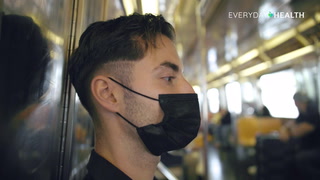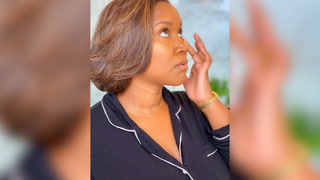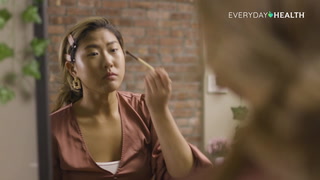‘I Can’t Cover Up Eczema When It’s on My Face’: Jesse’s Story
‘I Can’t Cover Up Eczema When It’s on My Face’

Next up video playing in 10 seconds
Jesse Dalton is no stranger to the toll eczema can take on your life. As an actor, he’s missed auditions and called out of rehearsals. As a waiter, he’s called out of work. As a friend, he’s canceled plans.
Eczema in High School: ‘My Skin Was Such a Mess’
Dalton’s skin became an issue in his teen years, when both cystic acne and atopic dermatitis — the most common type of eczema — started to appear on his face.

“Having eczema on top of acne, as a high schooler, it felt like having a civil war on my face,” he says. “I would have one patch that was extremely dry. I would have one patch that was oily and bumpy and pimply. It felt like every square centimeter [of my face] needed its own special spot treatment. And I was just guessing at how to treat it.”
Dalton dealt with his skin woes like any other self-conscious teen: by attempting to cover it up with his mother’s makeup. But that didn’t stop his peers from questioning what was going on with his skin. “I had friends saying, ‘Why are you wearing so much makeup?’ and then, when I wore less, ‘What’s wrong with your face?’” he says. “It was so embarrassing.”
He coped by keeping physical distance between himself and others. “I didn’t go out very much,” he says. “I was at home, waiting for my skin to get better.”
Self-Esteem Is the Invisible Struggle That Comes With Eczema
As an adult, Dalton seems to exude confidence, having overcome the insecurities of his teen years. “It was only recently that I started feeling more confident in my skin,” he says, which he attributes in part to having a better handle on his eczema treatment.
Yet Dalton still says the biggest challenge of having atopic dermatitis is how it affects his self-esteem. Even today, he’s no stranger to canceling plans or calling out of work when a bad flare crops up, because he doesn’t want to go out in public.
“I kind of resent having it on my face,” he says. “If it were anywhere else, there could be a way to mask it, to hide it. There’s just no way to cover raised, bumpy, patchy, dry skin all around [your face].”

During a flare, Dalton prefers not to leave the house for a few days, until it subsides. “It is a really alienating condition to live with. I feel lonely during those times.”
He has found a couple of ways to deal with eczema-related anxiety: meditation and yoga. “Getting in touch with my inner body, and not letting these itchy, painful flare-ups get the best of me, has been really helpful,” Dalton says.
Impostor Syndrome: Feeling Like a Fraud When Eczema Flares
Dalton knows eczema is not his fault. But at the same time, he admits feeling guilt and self-doubt about his condition. “Impostor syndrome is something that I feel a lot,” he says. “Saying to someone, ‘I can’t go, because I have an eczema outbreak’ … it sounds like a fake excuse.”
Part of that impostor feeling stems from a perception that he’s undermining the struggles other people face. He understands that things could be worse. “I realize that it’s not the end of the world to have an outbreak," he says. "But it’s still draining. It costs money. It’s emotionally taxing … and it’s still something that holds me back.”
When the COVID-19 pandemic hit, Dalton discovered a new eczema trigger. “Wearing a mask for more than an hour or two at a time triggers some of the worst flare-ups that I’ve ever had,” he says. “I had to call out from work one day, and of course my boss didn’t understand, because it sounds like such a vain thing. But it was really jarring to look at.”

Finding Allies Through Facebook
As a whole, Dalton feels like most people don’t understand what he’s going through. “There’s just such a lack of information about this condition,” he says. “People understand to a point, but it’s hard to explain to somebody that my skin looks so bad that I don’t even want to leave the house.”
During a flare, along with withdrawing socially, Dalton would also stop posting on social media as much as he usually did. But a few years ago, he got to a point where he finally mustered up the courage to post a photo of a particularly bad flare-up on his face. He thought maybe other people were experiencing something similar.

And he was right. Dalton received messages from other people who have eczema, and some of them sent photos of their own outbreaks.
“Just seeing that somebody else was living with it was really validating,” says Dalton. “Having a community of people to talk to about this has been really helpful, and it helps bring down those feelings of alienation and isolation.”
Dalton hopes others who are dealing with eczema are also able to feel validated about the emotional impact it has on them. “You’re allowed to feel that way,” he says. “It’s okay to feel that way.”
All images provided by Jesse Dalton.
This video interview took place in September 2021.
- Eczema. Cleveland Clinic. October 25, 2022.

Jacquelyn Dosal, MD
Medical Reviewer
Jacquelyn Dosal, MD, is a board-certified dermatologist practicing at The Dermatology House in Park City, Utah. Her areas of expertise include acne, rosacea, integrative treatments of inflammatory skin diseases, as well as laser treatment of the skin and injectables.
Dr. Dosal writes cosmetic questions for the certifying exams for the American Board of Dermatology. She is also the deputy editor for the American Academy of Dermatology's podcast, Dialogues in Dermatology.


